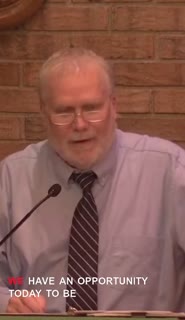Embracing Change: Building a Vibrant Church Community
Devotional
Sermon Summary
Bible Study Guide
Sermon Clips
"More people have left the church in the last 25 years than all the new people who became Christians from the Great Awakening, the Second Great Awakening, and all the Billy Graham crusades combined. That's an incredible statistic." [00:35:27] (19 seconds)
"The bottom line is this. The church is not a building constructed of large stones that can be thrown down. Instead, the church is a stable, healthy community of faith." [00:43:24] (15 seconds)
"The path towards new life is not easy, they say, but it is incredibly simple. It's not easy. And those of you that have suffered birth pangs know that it's not easy, but this path to new life is simple." [00:44:04] (20 seconds)
"In a radio interview, Graham offers a vision for ministry that could, I think, really truly help us in the future. He says that, We put the kingdom of Jesus first, not all our other kingdoms, but the kingdom of Jesus first, that will allow us to love neighbor as ourselves." [00:44:53] (19 seconds)
"We have an opportunity today to be radically countercultural once again, and to really, truly care for people, particularly the least of these people who have truly fallen through the cracks, the people who are suffering and marginalized." [00:45:38] (18 seconds)
Ask a question about this sermon
"The bottom line is this. The church is not a building constructed of large stones that can be thrown down. Instead, the church is a stable, healthy community of faith." [00:43:24] (15 seconds)
"The path towards new life is not easy, they say, but it is incredibly simple. It's not easy. And those of you that have suffered birth pangs know that it's not easy, but this path to new life is simple." [00:44:04] (20 seconds)
"In a radio interview, Graham offers a vision for ministry that could, I think, really truly help us in the future. He says that, We put the kingdom of Jesus first, not all our other kingdoms, but the kingdom of Jesus first, that will allow us to love neighbor as ourselves." [00:44:53] (19 seconds)
"We have an opportunity today to be radically countercultural once again, and to really, truly care for people, particularly the least of these people who have truly fallen through the cracks, the people who are suffering and marginalized." [00:45:38] (18 seconds)





